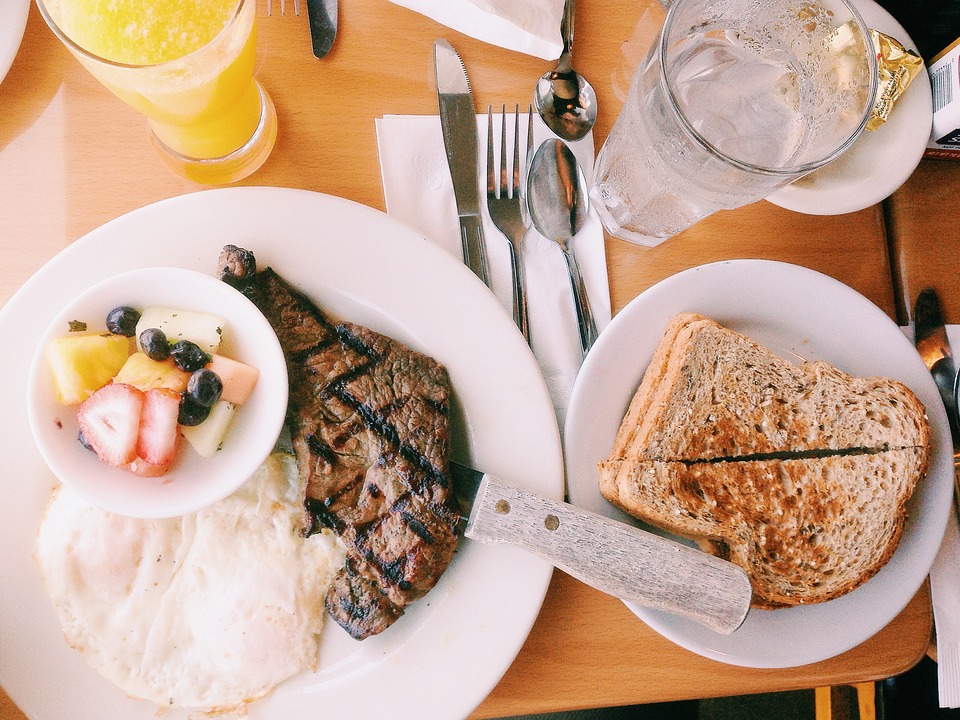The Steak and Egg Diet: A High-Protein, Low-Carb Approach to Weight Loss
When it comes to weight loss, there are countless diets out there that promise to help you shed pounds quickly and easily. One such diet that has gained popularity in recent years is the steak and egg diet, a high-protein, low-carb approach that encourages dieters to consume large amounts of red meat and eggs. But does it actually work? And is it safe? Let's take a closer look.
Introduction
The steak and egg diet is a relatively new approach to weight loss that has gained popularity in recent years. The basic premise of the diet is simple: eat only steak and eggs for a certain period of time in order to achieve rapid weight loss. While the idea of consuming large amounts of red meat and eggs may seem counterintuitive for weight loss, proponents of the diet claim that it can be highly effective.
How the Steak and Egg Diet Works
The steak and egg diet is based on the principles of a high-protein, low-carb diet. By eliminating carbohydrates and increasing protein intake, the body is forced to burn stored fat for energy, resulting in rapid weight loss. The diet typically consists of 2-3 meals per day, each containing a serving of steak and eggs. Other foods, such as vegetables, are typically not allowed on the diet.
Steak and eggs are both high in protein and provide essential nutrients such as iron, vitamin B12, and zinc. In addition, protein is known to promote feelings of fullness and reduce hunger, making it easier to stick to a low-calorie diet.
Health Benefits of the Steak and Egg Diet
Research has shown that high-protein diets, such as the steak and egg diet, can be highly effective for weight loss. One study published in the American Journal of Clinical Nutrition found that a high-protein diet led to greater weight loss and fat loss compared to a standard-protein diet. In addition, the high-protein group experienced greater satiety and reduced hunger, making it easier for them to stick to their diet.
Another study published in the International Journal of Obesity found that a low-carbohydrate, high-protein diet led to greater weight loss and fat loss compared to a low-fat, high-carbohydrate diet. The high-protein group also experienced greater improvements in cholesterol levels and other markers of cardiovascular health.
Potential Risks of the Steak and Egg Diet
While the steak and egg diet may be effective for weight loss, it is not without its risks. One major concern is the high saturated fat content in red meat, which has been linked to an increased risk of heart disease and other health problems. In addition, the diet may not provide adequate amounts of certain nutrients, such as fiber and vitamin C, which are found in fruits and vegetables.
Another potential concern is the long-term sustainability of the diet. By eliminating entire food groups, such as fruits and vegetables, the steak and egg diet may be difficult to stick to over time, increasing the risk of weight regain.
Related : 28 day egg diet
Tips for Following the Steak and Egg Diet
If you are considering the steak and egg diet, there are several tips to keep in mind to ensure that you are following the diet safely and effectively. First, be sure to choose lean cuts of beef, such as sirloin or round steak, to reduce your intake of saturated fat. In addition, try to incorporate other sources of protein, such as chicken or fish, to ensure that you are getting a variety of nutrients.
It is also important to make sure that you are getting enough fiber and other essential nutrients. This can be accomplished by adding low-carb vegetables, such as leafy greens, broccoli, and cauliflower, to your meals.
Potential Risks and Downsides of the Steak and Egg Diet
While the steak and egg diet may have some benefits for weight loss and muscle building, there are also some potential downsides and risks to consider. For example, a diet that is high in saturated fat and low in fiber may increase the risk of heart disease and other health problems.
Additionally, some people may experience unpleasant side effects from consuming a lot of red meat, such as digestive issues, kidney problems, or an increased risk of certain types of cancer.
It's also important to note that this diet may not be sustainable or practical for everyone. Eating only steak and eggs every day can quickly become monotonous and may lead to nutrient deficiencies if not carefully planned.
Tips for Incorporating the Steak and Egg Diet into Your Lifestyle
If you're interested in trying the steak and egg diet, it's important to do so in a safe and sustainable way. Here are some tips for incorporating this diet into your lifestyle:
Gradually transition into the diet, rather than making sudden changes that could shock your system.
Choose high-quality, grass-fed beef and organic, free-range eggs to maximize the nutritional benefits of this diet.
Be sure to also incorporate plenty of vegetables and other nutrient-dense foods into your diet to ensure you're getting a balanced intake of vitamins and minerals.
Consider working with a registered dietitian or nutritionist to ensure you're meeting your nutrient needs and to monitor your health while on this diet.
Steak and Egg diet 14 days Plan :
Day 1:
Breakfast: 2 eggs and 4 oz. steak
Lunch: 4 oz. steak and mixed greens salad with olive oil dressing
Dinner: 4 oz. steak and 1 cup of steamed broccoli
Day 2:
Breakfast: 2 eggs and 4 oz. steak
Lunch: 4 oz. steak and mixed greens salad with olive oil dressing
Dinner: 4 oz. steak and 1 cup of sautéed mushrooms
Day 3:
Breakfast: 2 eggs and 4 oz. steak
Lunch: 4 oz. steak and mixed greens salad with olive oil dressing
Dinner: 4 oz. steak and 1 cup of roasted Brussels sprouts
Day 4:
Breakfast: 2 eggs and 4 oz. steak
Lunch: 4 oz. steak and mixed greens salad with olive oil dressing
Dinner: 4 oz. steak and 1 cup of grilled zucchini
Day 5:
Breakfast: 2 eggs and 4 oz. steak
Lunch: 4 oz. steak and mixed greens salad with olive oil dressing
Dinner: 4 oz. steak and 1 cup of steamed asparagus
Day 6:
Breakfast: 2 eggs and 4 oz. steak
Lunch: 4 oz. steak and mixed greens salad with olive oil dressing
Dinner: 4 oz. steak and 1 cup of roasted sweet potatoes
Day 7:
Breakfast: 2 eggs and 4 oz. steak
Lunch: 4 oz. steak and mixed greens salad with olive oil dressing
Dinner: 4 oz. steak and 1 cup of grilled peppers and onions
Day 8:
Breakfast: 2 eggs and 4 oz. steak
Lunch: 4 oz. steak and mixed greens salad with olive oil dressing
Dinner: 4 oz. steak and 1 cup of sautéed spinach
Day 9:
Breakfast: 2 eggs and 4 oz. steak
Lunch: 4 oz. steak and mixed greens salad with olive oil dressing
Dinner: 4 oz. steak and 1 cup of roasted eggplant
Day 10:
Breakfast: 2 eggs and 4 oz. steak
Lunch: 4 oz. steak and mixed greens salad with olive oil dressing
Dinner: 4 oz. steak and 1 cup of grilled squash
Day 11:
Breakfast: 2 eggs and 4 oz. steak
Lunch: 4 oz. steak and mixed greens salad with olive oil dressing
Dinner: 4 oz. steak and 1 cup of roasted carrots
Day 12:
Breakfast: 2 eggs and 4 oz. steak
Lunch: 4 oz. steak and mixed greens salad with olive oil dressing
Dinner: 4 oz. steak and 1 cup of sautéed bok choy
Day 13:
Breakfast: 2 eggs and 4 oz. steak
Lunch: 4 oz. steak and mixed greens salad with olive oil dressing
Dinner: 4 oz. steak and 1 cup of grilled portobello mushrooms
Day 14:
Breakfast: 2 eggs and 4 oz. steak
Lunch: 4 oz. steak and mixed greens salad with olive oil dressing
Dinner: 4 oz. steak and 1 cup of steamed green beans
Remember to drink plenty of water throughout the day and listen to your body. If you feel hungry, you can add a small snack
Conclusion
The steak and egg diet is a controversial yet popular diet that has gained a following among bodybuilders and fitness enthusiasts.
While it may have some potential benefits for weight loss and muscle building, it's important to consider the potential risks and downsides, as well as the fact that this diet may not be sustainable or practical for everyone.
If you're interested in trying this diet, it's important to do so in a safe and sustainable way, with the guidance of a healthcare professional or registered dietitian. Ultimately, the best diet for you is one that is balanced, nutrient-dense, and sustainable in the long term.
--------------
References
Lippi G, Mattiuzzi C, Cervellin G. Meat consumption and cancer risk: a critical review of published meta-analyses. Crit Rev Oncol Hematol. 2016;97:1-14. doi:10.1016/j.critrevonc.2015.11.008
Wycherley TP, Buckley JD, Noakes M, Clifton PM, Brinkworth GD. Comparison of the effects of weight loss from a high-protein versus standard-protein energy-restricted diet on strength and aerobic capacity in overweight and obese men. Eur J Nutr. 2013;52(1):317-325. doi:10.1007/s00394-012-0343-5
Frestedt JL, Zenk JL, Kuskowski MA, Ward LS, Bastian ED. A whey-protein supplement increases fat loss and spares lean muscle in obese subjects: a randomized human clinical study. Nutr Metab (Lond). 2008;5:8. doi:10.1186/1743-7075-5-8

